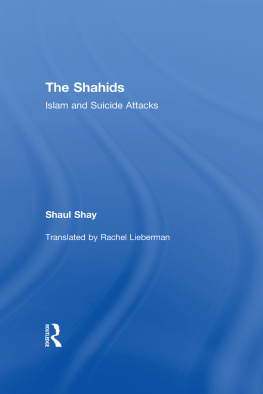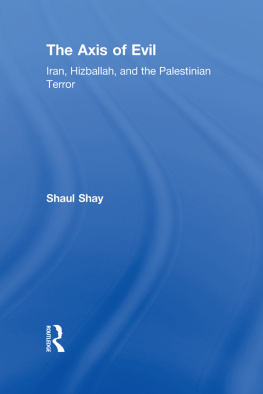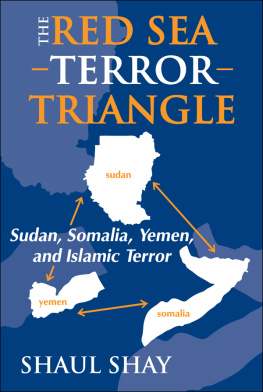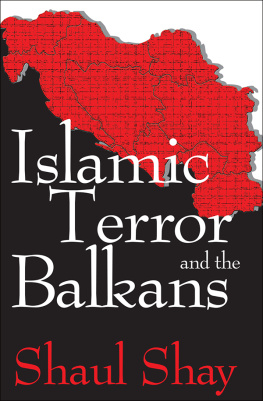The
Shahids
The
Shahids
Islam and
Suicide Attacks
Shaul Shay
With a foreword by
Aharon Zeevi Farkash
Translate by Rachel Lieberman
The Interdisciplinary Center, Herzliya

The International Policy Institute for Counter-Terrorism
First published 2004 by Transaction Publishers
Published 2017 by Routledge
2 Park Square, Milton Park, Abingdon, Oxon OX14 4RN
711 Third Avenue, New York, NY 10017, USA
Routledge is an imprint of the Taylor & Francis Group, an informa business
Copyright 2004 by The Interdisciplinary Center for Herzliya Projects.
All rights reserved. No part of this book may be reprinted or reproduced or utilised in any form or by any electronic, mechanical, or other means, now known or hereafter invented, including photocopying and recording, or in any information storage or retrieval system, without permission in writing from the publishers.
Notice:
Product or corporate names may be trademarks or registered trademarks, and are used only for identification and explanation without intent to infringe.
Library of Congress Catalog Number: 2003067190
Library of Congress Cataloging-in-Publication Data
Shay, Shaul.
The shahids : Islam and suicide attacks / Shaul Shay ; with a foreword by
Aharon Zeevi Farkash ; translated by Rachel Lieberman.
p. cm.
The Interdisciplinary Center, Herzliya. The International Policy Institute
for Counter-Terrorism.
Includes bibliographical references and index.
ISBN 0-7658-0250-3 (cloth : alk. paper)
1. Suicide bombers. 2. Suicide bombings. 3. Islam and terrorism. I.
International Policy Institute for Counter-Terrorism (Israel). II. Title.
HV6431.S4659 2004
303.625dc22
2003067190
ISBN 13: 978-0-7658-0250-7 (hbk)
This book is dedicated to the memory of my teacher,
the leading expert on terror,
the late Professor Ehud Sprinzak
Contents
ALFArab Liberation Front (A pro-Iraqi Palestinian terror organization)
BKIBabbar Khalsa International
Defense ShieldIDF campaign against terror entities and the Palestinian Authority following the wave of terror perpetrated in March 2002
DFLPDemocratic Front for the Liberation of Palestine (a secular Palestinian terror organization)
Determined PathIDF campaign against terror entities and the Palestinian Authority during the months of JulyAugust 2002
Ebb and FlowTerm the Israeli Defense Force (IDF) uses to refer to the Al-Aksa Intifada
FatwaIslamic religious ruling
GIAArmed Islamic Front in Algeria
Global Islamic JihadConfederation of radical Islamic terror organizations headed by Bin-Laden and Al-Qaida
IDFIsraeli Defense Force
JihadHoly war waged by Islam against heretics, enemies of Islam
LTTEThe Tamil Tigers
Palestinian Islamic JihadIslamic terror organization
PFLPPopular Front for the Liberation of Palestine
PKKThe Workers Party of Kurdistan
ShariaIslamic law
Since September 2000, the State of Israel has been fighting for its home. This war constitutes a violent clash with the Palestinian Authority and Palestinian terror organizations stemming from a strategic decision on Yasser Arafats part to attempt to attain by the force of terror those strategic objectives that he was unable to achieve at the negotiation table. In the course of this conflict, the Palestinians have made extensive use of suicide attacks, which they regard as a strategic weapon in their confrontation with Israel.
Since the beginning of the violent incidents, the Palestinians have perpetrated over 100 suicide attacks; scores of other suicide attacks were thwarted by the IDF and Israeli security forces. Although suicide attacks constitute less than 1 percent of all of the attacks perpetrated by the Palestinians (123 out of approximately 20,000 attacks), in their grave consequences they account for over 50 percent of the Israeli fatalities, the majority of whom were civilians (900 victims). Since the Oslo Agreements, Palestinian suicide attacks have been carried out by Islamic terror organizations and the Palestinian Islamic Jihad. Since October 2001, the trend has shifted and currently secular terror organizations such as the Popular Front and the Fatahs Martyrs of the Al-Aksa Brigades are also joining the ranks of suicide attack perpetrators.
Terror, including suicide attacks, constitutes a strategic problem not only for the State of Israel; it threatens the well-being and security of the entire Free World. The Al-Qaida Organization and additional Islamic terror organizations have adopted suicide attacks as a modus operandi in their struggle against their adversaries all over the world. The September 11 attacks represent a historical milestone in the threat that terror poses against global security, and took the heaviest toll in bloodshed in the annals of terror.
The terror campaign operated by the Palestinian Authority, including suicide terror, thus constitutes part of a growing trend, particularly in radical Islamic circles, to turn this modus operandi into a strategic weapon that Islam wields against its foes. This was expressed in the attack campaign sponsored by radical Islamic entities during October-November 2002, in which, starting from Yemen (the attack against the French oil tanker), through Bali, Indonesia, and finally in Moscow where Chechen terrorists took over a theater, use was made of Islamic suicide attackers.
The Shahids: Islam and Suicide Attacks analyzes the roots of the phenomenon of Islamic suicide attacks, the modi operandi of various organizations worldwide, and offers a series of recommendations regarding how to contend with the phenomenon. This volume constitutes a unique contribution to professional literature pertaining to the area of terror in general, and suicide terror in particular, and the ways to contend with them.
Aharon Zeevi Farkash, Major General
Director of Military Intelligence, IDF
January 2003
Suicide terror is not a new phenomenon. Nevertheless, the intensive use of suicide bombers and the lethal consequences of this activity have turned suicide terror into a strategic threat against the security and stability of Western society, and perhaps against the security of human society as a whole.
This volume was written against the background of the September 11, 2001 attacks perpetrated in the United States, and in light of the unprecedented suicide terror campaign being carried on by the Palestinians since September 28, 2000, the beginning of the Al-Aksa Intifada. It focuses on the phenomenon of Islamic suicide attackers because Islamic terror organizations, spearheaded by Al-Qaida, have turned suicide terror into a strategic weapon in the cultural conflict between radical Islam and its adversaries, with Western culture (including Israel and Zionism) at the top of its list. While it does indeed focus on Islamic suicide terror, it also addresses secular terror organizations functioning in Muslim states or within national/ethnic conflicts, where one of the sides to the conflict is Islamic (for example, secular organizations in the Arab-Israeli conflict, the PKK [The Workers Party of Kurdistan] in Turkey, and more).














